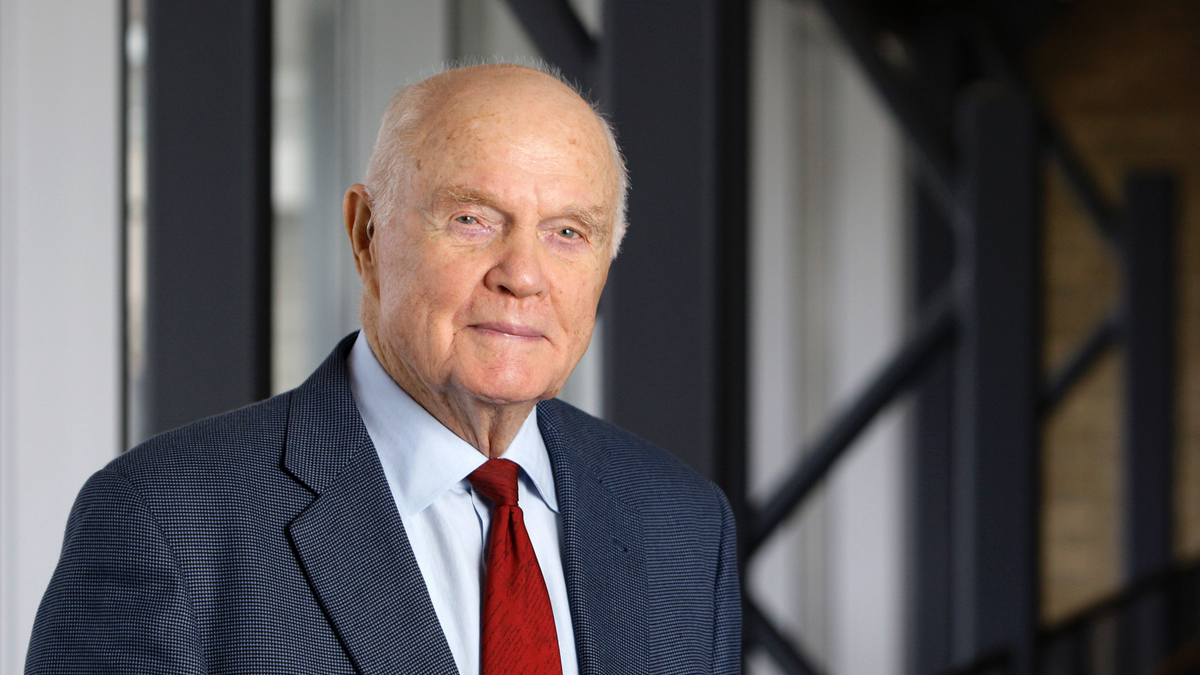
DOVER, Del. – A lengthy investigation by Air Force officials has concluded that the remains of astronaut and former U.S. Sen. John Glenn were not treated disrespectfully at the Dover Air Force Base mortuary before he was buried at Arlington National Cemetery last year.
The Air Force launched a probe in May 2017 amid concerns that inspectors visiting the facility had been invited to look at Glenn's remains, which they declined to do.
The heavily redacted report found that Glenn's remains were treated with dignity, but it also cited unrelated incidents involving questionable behavior by the former mortuary chief, William Zwicharowski.
Zwicharowski, who retired earlier this year, told the Associated Press last year that Glenn's remains were treated with "impeccable care," and that the invitation to inspectors was "solely professional." Repeated attempts to contact him for comment on the report were unsuccessful.
Although an investigating officer concluded that Zwicharowski's invitation to view Glenn's body was inappropriate, it did not result in any disrespectful behavior.
"The investigating officer interviewed everyone involved in Senator Glenn's care, under oath; all testified that Senator Glenn's remains were treated with dignity and respect while at Dover," stated the report, which is dated November 2017 but was not made publicly available until several days ago.
The report also found no systemic issues in Air Force Mortuary Affairs Operations, headquartered at the Delaware military facility, or with the manner in which human remains are treated.
It did find, however, a division between "back of the house" mortuary workers and AFMAO leadership. The rift dates back to 2008, when AFMAO was formed and assumed oversight of the mortuary, which previously had been part of the 436th Airlift Wing's Services Squadron.
"Rather than a systemic problem, the division seemed to be a result of personality conflicts between individual employees," the report stated.
The investigation appeared to place much of the blame for the rift on Zwicharowski, who was uniformly lauded for his technical skills but described by some people as difficult to work with and quick to try to assign blame to others if a problem arose.
"The investigation substantiated several allegations of inappropriate behavior by the employee," Ann Stefanek, Air Force chief of media operations, said in a prepared statement. "Earlier this spring, however, the employee retired before administrative action decisions had been made."
The report found, among other things, that Zwicharowski failed to promote appropriate employee-management relations by engaging in "insolent and insubordinate conduct toward his superiors and failing to carry out assigned work."
It also concluded that he engaged in inappropriate conduct in the presence of human remains.
The investigation found that Zwicharowski "did not cross the line" when, during a busy and stressful time at the mortuary several years, he picked up a plastic bag containing a severed hand and asked "Does anybody need a hand?" A chaplain who was interviewed about the incident suggested that it was indicative of mortuary-related humor that can help "maintain sanity."
The investigator did conclude that Zwicharowski acted inappropriately on two other occasions. The first occurred in March 2015 and involved the partial facial remains of a fallen service member. Zwicharowski reportedly leaned down and yelled "Can you hear me?" into the detached ear.
The other incident occurred in March 2017 and involved a severed arm. A service member temporarily assigned to the mortuary reported that he saw Zwicharowski manipulate the tendons of the arm so that the middle finger mimicked an obscene gesture. The investigator could not conclude that Zwicharowski acted intentionally but blamed him for not correcting any misperceptions when a bystander laughed and took it as a joke.
In 2012, Zwicharowski and two colleagues received public servant awards from the U.S. Office of Special Counsel for blowing the whistle on problems at the mortuary. But he said last year that morale among mortuary staff was "horrific," and he described the work environment as "toxic," suggesting micromanagement by uniformed leaders with no experience in the funeral industry was to blame.

